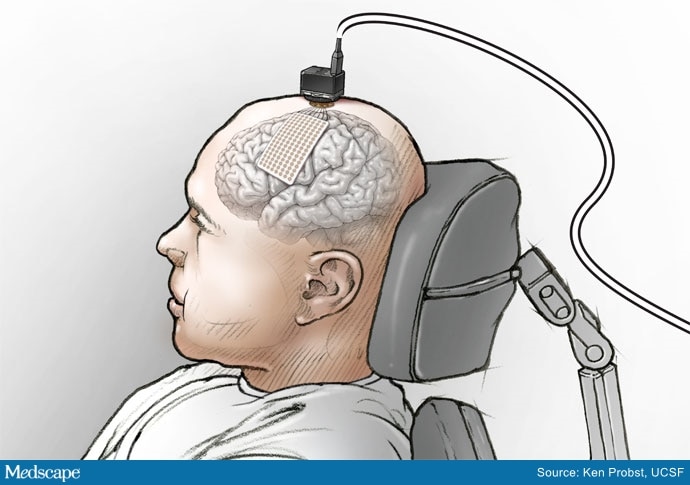A “speech neuroprosthesis” that translates brain signals into words that appear on a screen has helped a man with severe paralysis, who had lost the ability to speak, communicate in sentences.
It’s believed to be the first time words and sentences were decoded directly from cortical activity during attempted speech from someone who is paralyzed and cannot speak.
“When we started this project, there were no real guarantees that it would work and we were thrilled to see the accurate decoding of a variety of meaningful sentences. It was really remarkable,” lead author David Moses, PhD, with University of California San Francisco (UCSF), told Medscape Medical News.
“It clearly demonstrates the potential for this approach to give a voice to people with severe paralysis and speech loss,” said Moses.
The study was published in the July 15 issue of the New England Journal of Medicine.
The First 50 Words
In recent years, several research groups have worked to harness brain signals to get around a disability. Mind-controlled prosthetics have allowed paralyzed people to control artificial limbs or type out letters one-by-one in text through a brain–computer interface.
The UCSF team says their approach differs from these efforts in a critical way: it involves translating signals intended to control muscles of the vocal system for speaking words, rather than signals to move the arm or hand to enable typing.
“It’s our philosophy that speech is the ultimate goal of any communication neuroprosthesis,” Moses said.

An illustration depicting the UCSF team’s implant of a subdural, high-density, multi-electrode array over the area of the sensorimotor cortex that controls speech.
The first patient to test the speech neuroprosthesis was a man in his late 30s who suffered a brainstem stroke 15 years ago, which led to widespread paralysis and loss of speech (anarthria).
The UCSF team implanted a subdural, high-density, multi-electrode array over the area of the sensorimotor cortex that controls speech.
Over the course of 48 sessions, they recorded 22 hours of brain activity while the man attempted to say individual words from a vocabulary set of 50 “high-value” words capable of generating more than 1000 sentences.
Advanced computer algorithms analyzed the brain patterns when the man attempted to say common words such as “water,” “family,” or “good.” The algorithms were eventually able to decode words and full sentences.
When the team prompted the man with simple questions on a screen — such as “How are you today?” and “Would you like some water?” — the man’s attempted speech appeared on the screen: “I am very good,” and “No, I am not thirsty.”
The neural signal detection and computational analysis to decode each word takes roughly 4 seconds.
The system is able to decode words from brain activity at rate of up to 18 words per minute (median 15 words per minute) with up to 93% accuracy (median, 75%), according to the UCSF team.
Pioneering Work
While these early results in a single patient represent a proof-of-principle, they show “strong promise to restore communication by tapping into the brain’s natural speech machinery,” UCSF senior author Edward Chang, MD, said in a news release.
“There’s obviously a long, long way to go and a lot of work to be done before this can be something that is an actual market application and broadly useful,” Moses told Medscape Medical News.
Moving forward, they plan to test the speech neuroprosthesis on more patients affected by severe paralysis and communication deficits. They are currently working to increase the number of words in the available vocabulary, as well as improve the rate of speech.
“For persons with anarthria, it would be an extraordinary accomplishment to decode intended speech from brain signals alone,” Leigh Hochberg, MD, PhD, and Sydney Cash, MD, PhD, with the Center for Neurotechnology and Neurorecovery, Massachusetts General Hospital, Boston, note in an accompanying editorial.
“With this pioneering demonstration of how a person with anarthria caused by a brain-stem stroke can generate text just by attempting to speak, efforts to restore neurologic function for persons with amyotrophic lateral sclerosis, cerebral palsy, stroke, or other disorders move closer toward clinical benefit,” they say.
“Ultimately, success will be marked by how readily our patients can share their thoughts with all of us,” they add.
Funding for this research was provided by the National Institutes of Health, philanthropy, and a sponsored research agreement with Facebook Reality Labs (FRL), which completed in early 2021. Author d isclosures are available with the full text of this article at NEJM.org.
N Engl J Med. Published July 15, 2021. Abstract, Editorial
For more Medscape Neurology news, join us on Facebook and Twitter
Source: Read Full Article
